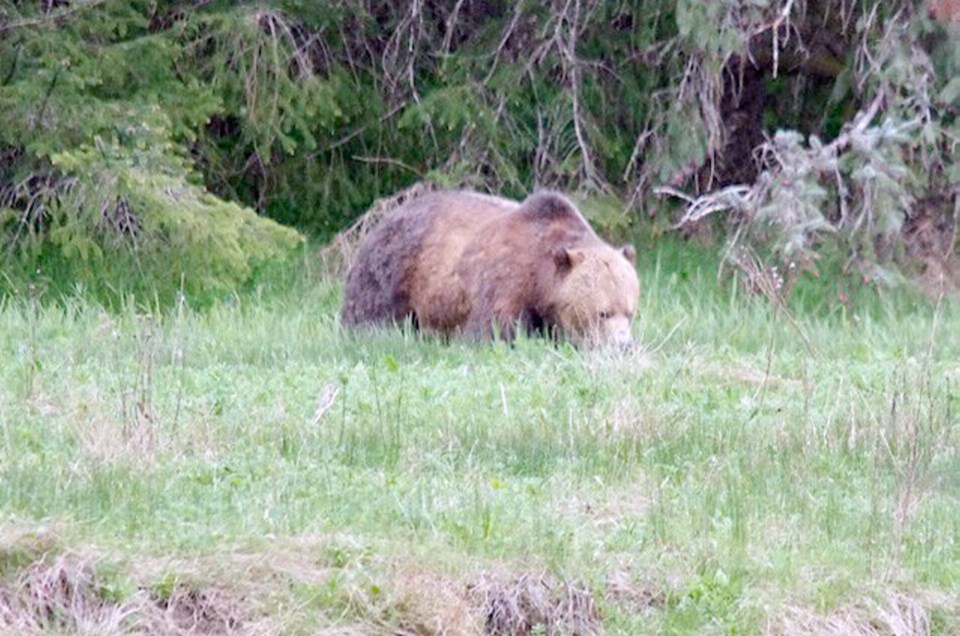The mayor of Sayward says there are at least seven grizzly bears in and around the north Vancouver Island village, and he’s warning shutterbugs to stay away to protect themselves and the big bruins.
Bill Ives said at least seven grizzly sightings have been reported to council over the past several weeks, including a pair he witnessed last week.
“Male or female? I wasn’t going to get close enough to look,” Ives said Wednesday.
One of the grizzlies was spotted on the Sayward dock sniffing fishing boats.
Grizzlies are creating a buzz because they are rare on Vancouver Island, although they have been known to swim from small islands between Vancouver Island and the mainland in search of new territory and food.
Conservation and town officials are warning people to be on the lookout, and have placed caution tape along Sayward’s main trails along the Salmon River.
Council has also warned businesses and residents about securing garbage and only putting their trash out on pickup days.
Still, some people aren’t heeding the warnings, said Ives.
“If you don’t attract bears, you won’t have a problem,” said Ives. “There is no desire from anyone to shoot a bear.
“The problem is like with COVID-19 … some people don’t respect orders around that. You get people with cameras who want to get the perfect shot.” One couple with five kids went under the caution tape trying to see a bear, he said.
Ives said there have been days when up to nine vehicles are stopped along logging roads in the Sayward Valley as people try to photograph grizzlies, which creates a danger for logging trucks.
He is also telling people to stay away because of the pandemic. Ives said he doesn’t know of any COVID-19 cases in his community or the surrounding valley and wants to keep it that way.
“People from Victoria or Nanaimo will hear about this and they’ll come to our community and stop at our Co-op for gas or food, and could bring something with them,” said Ives. “It adds another level of concern.”
A Facebook post on April 29 from someone on their way to work in Port Hardy from Campbell River shows video and photos of a young grizzly gingerly stepping out of the bush on Rock Bay Road, about 30 minutes from Campbell River along Highway 19.
Ives said he also had a large grizzly bear grazing in his backyard last year. They have to be respected, he said. “I’ve been out walking with my dog and have come across black bears completely gutted,” said Ives, who assumed it was the work of a grizzly bear.
Nicolas Scapillati, executive director of the Grizzly Bear Foundation, said grizzly bears need vast territory and food, which Vancouver Island has in abundance. “They are very different than black bears. They travel great distances for mates, food sources and territory.”
Scapillati said the bears are in search of berries and other food sources as salmon runs decline. There is no definitive number for grizzlies on Vancouver Island; most grizzlies here are young males “driven by their genetics, seeking new territories to find mates.”
A spokesman for the Ministry of Forests said wildlife staff have received reports of at least two grizzly-bear sightings north of Campbell River. For the past few years, the bears have appeared in the spring and disappeared in the fall, the ministry said.
It’s unclear if the grizzlies hibernate on Vancouver Island or return to the mainland each fall.
The ministry cautions people not to approach the bears, no matter how passive they seem.
Scapiillati said the Grizzly Bear Foundation is working with First Nations in the Broughton Archipeligo and wants to include communities and conservation officials in developing a strategy to co-exist with grizzlies, because it looks as if they will continue expanding their territory.
A grizzly bear dubbed Malilakala made headlines in April after swimming to Vancouver Island from Hanson Island in the Broughton Archipelago. The bear was tranquilized and relocated in what was hailed as a historic effort involving the foundation, First Nations who named the bear, ecotourism operators and conservation officers.
The bear was shot and killed weeks later in what was described as an act of self-defence.
Scapillati said despite the successful relocation, the bear’s movements weren’t traced and it likely wandered into a dangerous situation in search of food. “Grizzlies don’t want to get into trouble with people,” he said.
He said grizzlies play a huge role in nature, particularly in coastal ecosystems. Salmon carcasses they discard fuel tree and plant growth, and in the alpine, they cultivate the soil by digging up squirrel holes and bulbs.
“From the top of the mountain to the valley bottom and estuaries, they are a keystone species for biodiversity.”
Anyone who sees a grizzly bear on the Island is asked to call the Conservation Officer Service at 1-877-952-RAPP.



